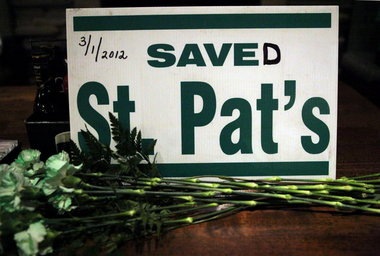VATICAN Decree Says Bishop Richard Lennon Failed to Follow Church Law in Closing St. Patrick's
By Michael O'Malley
Bishop Richard Lennon of the Cleveland Catholic Diocese did not follow church law or procedures when he closed St. Patrick Church in Cleveland's West Park neighborhood nearly two years ago, according to a Vatican decree. The decree was publicly disclosed Thursday at a news conference held by St. Patrick parishioners who appealed to the Vatican when Lennon closed the church. The decree, which reversed Lennon's decision, was emailed to St. Patrick parishioners by their lawyer in Rome Wednesday. Twelve other Northeast Ohio parishes also won their appeals, but most are awaiting official word from Rome. The St. Patrick decree said Lennon improperly issued the closing order and did not consult with the Presbyteral Council, a local panel of diocesan priests, as required by church law when closing a church. The Congregation of the Clergy, a Vatican panel that issued the decree, said it advised Lennon in 2009 on his procedural "shortfalls," but the bishop "declined to clarify the matter." "Hence, the Bishop of Cleveland is held to have acted in violation of the law on procedural grounds," the decree reads. The diocese said Thursday it had not yet received the official copies of the decrees. "The Diocese of Cleveland is awaiting official word from the Vatican concerning any decrees," spokesman Robert Tayek said in a statement. "We first must see the official documents in order to review them and understand what exactly is being said; only then can a response be determined." Lennon, between 2009 and 2010, closed 50 churches in the eight-county diocese, citing shortages of priests, cash and parishioners. Some congregations he merged together. Others he rendered extinct, a move known as suppression. Thirteen of those churches filed appeals to the Vatican, followed by a deluge of letters from parishioners pleading their cases to the Congregation of the Clergy. The Congregation ruled in favor of all 13 churches, which, while under appeal, have been standing empty since their closings. The diocese, which has sold a number of closed churches, could not by law sell a church or its contents while it was under appeal. Now, if Lennon complies with the Vatican decree, the diocese must find the resources and personnel to reopen the 13 mothballed buildings. The diocese did not respond Thursday to Plain Dealer questions about the challenges of reopening and staffing the churches. The bishop has 60 days to appeal the reversals to the Apostolic Signatura, the Vatican's supreme court. Meanwhile, parishioners from the churches that appealed are celebrating with parties, vigils and prayers. "This means that all 13 parishes are now full-fledged Catholic parishes under canon law," Patricia Schulte-Singleton said Thursday at a barroom rally that erupted in cheers and applause. "It is our understanding that once Bishop Lennon receives the decrees from the Vatican, St. Patrick parish and church and the 12 others must be promptly reopened." Along with St. Patrick, the other churches that appealed were St. Adalbert, St. Barbara, St. Casimir, St. Emeric, St. Peter and St. Wendelin, all in Cleveland; St. James in Lakewood; St. Mary in Bedford; St. Margaret Mary in South Euclid; and St. John the Baptist, St. Martha and St. Mary, all in Akron. St. James also had received a copy of its decree by Thursday. All 13 essentially read the same, said Peter Borre, a Boston activist fighting the closings of parishes and who represented some Cleveland churches in their appeals. When word of the reversals first hit electronic and print media Wednesday, it spread rapidly through Facebook and other social media. About 70 people spontaneously gathered at St. James in Lakewood that night to hug each other in giddy laughter and tears of joy. "All of a sudden, people started showing up," said Toni Sabo, president of Friends of St. James, a group of parishioners that challenged Lennon's closing. "It was like a family reunion." St. James, a stone hulk of an edifice built in the 1930s, has been sitting empty for nearly two years. Sabo said the diocese has been good at keeping the place maintained while the appeal was pending. She said parishioners are ready to roll up their sleeves and do what needs to be done to get back into their landmark sanctuary. "It shouldn't be too much work," she said. "Maybe a good dusting." The Friends of St. James were planning to gather outside the church Thursday evening to pray the rosary. "We've got to give thanks," said Sabo. "This is far more reaching than what we ever expected." She cautioned, though, that the battle might not be over if Lennon appeals the reversals. "Now we'll have to see what our bishop will do," she said. "The ball is in his court." Sabo and other St. James parishioners attended the St. Patrick rally on Thursday, as did Joe Balint, a Hungarian immigrant who attended St. Emeric Catholic Church. "I never gave up hope," he said. "Everyday I said two rosaries. The Lord never lets his people down." Linda Gamble, a former parishioner at the closed St. Adalbert on Cleveland's East Side, said she and the scattered congregation were waiting to hear from the diocese what the next step will be. "We're going to sit in peace and sit happily waiting," she said. "But I'm ready to get back on those old broken kneelers."
|
.
Any original material on these pages is copyright © BishopAccountability.org 2004. Reproduce freely with attribution.
